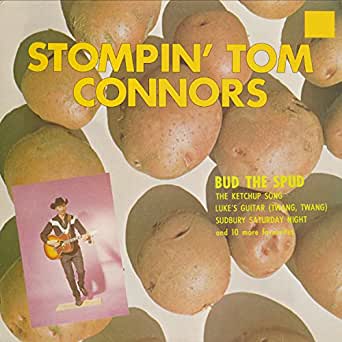I’m not much into what Nashville passes off as country music these days, but let’s assume for a moment that these artists are worthy of “country” status: Shania Twain, Anne Murray (she’s approved), K.D. Lang, Terri Clark, Paul Brandt and Emerson Drive. What do these half-dozen performers have in common? If you said they are all Canadian, you’re right. Then again, if you answered that if he was still alive, Charles Thomas Connors — better known as “Stompin’ Tom Connors,” would have loathed all of them, you’d also be dead-on.
Canadians love country music, and their country has offered its share of home-grown talent. But Nashville is where careers are built, and Canadians seeking high billing in country music usually relocate to the city in search of stardom in the U.S. and Canada. Stompin’ Tom Connors, one of Canada’s most successful country musicians, never relocated. He never became a star in the U.S. His music, even “Bud the Spud,” a trucking song of the “golden age,” received no airplay in the U.S. But one fact always remained true — Tom Connors didn’t care.
Connors was born in 1936, in Saint John, New Brunswick. His teenage mother was poor, a fact Connors described when saying they lived in the “poorest, most run-down part of Saint John.” Connors later said he didn’t realize how poor he was until he saw his mother steal food for the first time.
Young Tom must have led an eventful life. When Connors discussed his autobiography, he said that he tried to remember every moment of his life. Mentioning 130 pages of single-spaced narrative, Connors said, “That covers everything through age four.”
While Connors was still young, his mother was sentenced to a low-security prison; stealing food to avoid starvation was likely the worst of her crimes. With nowhere else for Connors to go, she brought him along. In short order, authorities stepped in, and a family living in Skinner’s Pond, Prince Edward Island (PEI) adopted him. The province would provide inspiration for Connors’ first hit single, but he traveled a long road before recording music.
Connors hitchhiked out of PEI at age 15, spending 13 years working odd jobs and writing songs. He finally settled in Ontario, accepting a one-year contract to entertain at a hotel. He soon launched his recording career.
Connors never sought the nickname “Stompin’ Tom.” Instead, the owners of the low-class, loud and rowdy venues he played gave it to him, and it stuck. Connors couldn’t just tap his toe to keep time with the music; he wanted to hear his foot. He stomped the stage with his boot heel so hard that venue owners complained he cracked the stage. Connors began bringing plywood to shows, stomping on it until it was broken. He’d then complain about low-quality lumber and call for another piece. When asked why he stomped so hard, Connors answered, “It’s just a stage I’m going through.”
Connors is credited with writing more than 300 songs and releasing four dozen albums. His sales topped 4 million records — virtually all in Canada. In fact, Stompin’ Tom didn’t allow his music to be released in the U.S. He was a proud Canadian who sang about Canadian topics. He admitted he had no love lost for Canadians who left home to achieve stardom in Nashville — “turncoats,” he called them. Aside from his song “The Good Ole Hockey Game,” played today at many National Hockey League arenas, his music is virtually unknown to Americans. While enjoying his greatest success from 1970-1972, when he had three No. 1 and two No. 2 songs on Canada’s country charts, the title song from his 1969 album, “Bud the Spud,” may be his most lasting.
In “Bud the Spud,” Connors sings of a PEI truck driver hauling potatoes across Canada. Connors’ reputation could have caused fellow countrymen to believe he meant the song as an insult to Americans. Many recognize Idaho potatoes as the gold standard, but the Canadian maritime provinces are also well-known for producing them by the tens of millions. In fact, Canadians will claim Idaho’s crop can’t compare to its “budados,” almost as if Canada grows a different commodity. Of course, it’s the same root vegetable with the same spelling, but at least on PEI, it’s pronounced “bu-da-do” (with “u” as in “us,” “da” as in “day,” and “do” as in “dough).
“Bud the Spud” struggled for radio play, but live audiences loved it. Eventually, DJs in Nova Scotia started playing the song based on listener demand. When Connors returned to PEI after a 14-year hiatus, audiences couldn’t get enough of “Bud.” Connors sang his song six times before closing in front of a rowdy church hall that would’ve stayed all night had he kept playing it.
The story behind “Bud the Spud” isn’t much of a story at all. “It was written kind of quickly,” Connors said. “I wanted to write a song about PEI, and a friend wanted me to write him a trucking song.” The two songs gelled into one. The friend, Bud Roberts, didn’t care for the song and didn’t record it. For Connors, it was a blessing.
The opening lyrics — “It’s Bud the Spud from the bright red mud” — referencing PEI soil, and the following lines describe the large “budados” it grows. With a truckload of the crop, Bud regularly ferries from PEI to New Brunswick before heading to Montreal and Ontario.
“Bud” isn’t popular among Canada’s traffic officers — “Now the Ontario Provincial Police don’t think mucha Bud. … the cops been looking for the son of a gun that’s been rippin’ the tar off the 401” — referring to a 500-mile highway crossing Ontario. The remainder of the song praises “Bud the Spud” for his thirst of delivering PEI potatoes across Canada. Connors closes by commenting that Bud hauls “the best doggone potatoes that’s ever been growed — and they’re from Prince Edward Island.”
“Bud the Spud,” if nothing else, had staying power. In 1994 the song became a children’s book featuring the travels of Bud and a dog companion, and in 2013 Parliament sang it before a hearing. Again, Stompin’ Tom couldn’t have cared less.
In the 1970s Connors earned a half-dozen Juno awards, Canada’s top recognition for artists. Soon after, he decided the Junos didn’t represent Canada when they rewarded the “turncoats” who’d gone to Nashville. He even started a brief but unintentional racial controversy when he complained that country-music icon Charley Pride, one of few African-American country artists, was presented a Juno award. Eventually, Connors returned his Junos along with a letter stating, “As far as I am concerned, you can give them to the border jumpers who didn’t receive an award this year, and maybe you can have them presented by Charley Pride.” He also vowed to never accept another Juno nomination or award.
Connors never buried his hatchet, later declining induction into the Canadian Country Music Hall of Fame. But he couldn’t avoid all recognition. A 2004 television show, “The Greatest Canadian,” ranked Stompin’ Tom as the 13th-greatest person born in the country. The top performing artist on the list, he beat out Canadian icons Bobby Orr, Gordie Howe, and even Dr. James Naismith, the man who invented basketball. Naismith’s presence on the list likely angered Stompin’ Tom, as he invented the game in Massachusetts the same year he left Ontario to live the remainder of his life in the U.S.
Over the course of four decades until Connors’ death of kidney failure in 2013, he stomped his way across Canada. In the process, he recorded what is likely the most popular Canadian truck-driving song. And whether Connors would have liked it or not, “Bud the Spud” did become known outside Canada thanks to YouTube, where one of several videos has been visited more than a half-million times.
Until next time, keep with the rhythm of the highway, and key up an Anne Murray tune for the heck of it. You’ll probably hear Tom Connors stompin’ a hole in his grave in the background.
Since retiring from a career as an outdoor recreation professional from the State of Arkansas, Kris Rutherford has worked as a freelance writer and, with his wife, owns and publishes a small Northeast Texas newspaper, The Roxton Progress. Kris has worked as a ghostwriter and editor and has authored seven books of his own. He became interested in the trucking industry as a child in the 1970s when his family traveled the interstates twice a year between their home in Maine and their native Texas. He has been a classic country music enthusiast since the age of nine when he developed a special interest in trucking songs.







